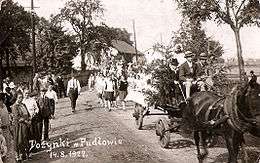Pudlov
![]()
![]()

History
The village was first mentioned in a written document in 1428. It was heavily influenced by the industry. At the beginning of the 20th century rapid industrial development occurred, this led also to a rise of the village's population.
According to the Austrian census of 1910 the village had 3,016 inhabitants, 2,865 of whom had permanent residence there. The census asked people for their native language, 1,761 (61.5%) were German-speaking, 992 (34.6%) were Polish-speaking and 112 (3.9%) were Czech-speaking. Jews were not allowed to declare Yiddish, most of them thus declared the German language as their native. The most populous religious groups were Roman Catholics with 2,733 (90.6%) followed by Protestants with 112 (3.7%).[2]
After World War I, fall of Austria-Hungary, Polish–Czechoslovak War and the division of Cieszyn Silesia in 1920, the village became a part of Czechoslovakia. Following the Munich Agreement, in October 1938 together with the Zaolzie region it was annexed by Poland, administratively organised in Frysztat County of Silesian Voivodeship.[3] The village was then annexed by Nazi Germany at the beginning of World War II. After the war it was restored to Czechoslovakia.
Czech footballer Tomáš Pospíchal was born here.
Footnotes
- Population statistics of Bohumín
- Ludwig Patryn (ed): Die Ergebnisse der Volkszählung vom 31. Dezember 1910 in Schlesien, Troppau 1912.
- "Ustawa z dnia 27 października 1938 r. o podziale administracyjnym i tymczasowej organizacji administracji na obszarze Ziem Odzyskanych Śląska Cieszyńskiego". Dziennik Ustaw Śląskich (in Polish). Katowice. nr 18/1938, poz. 35. 31 October 1938. Retrieved 1 July 2014.